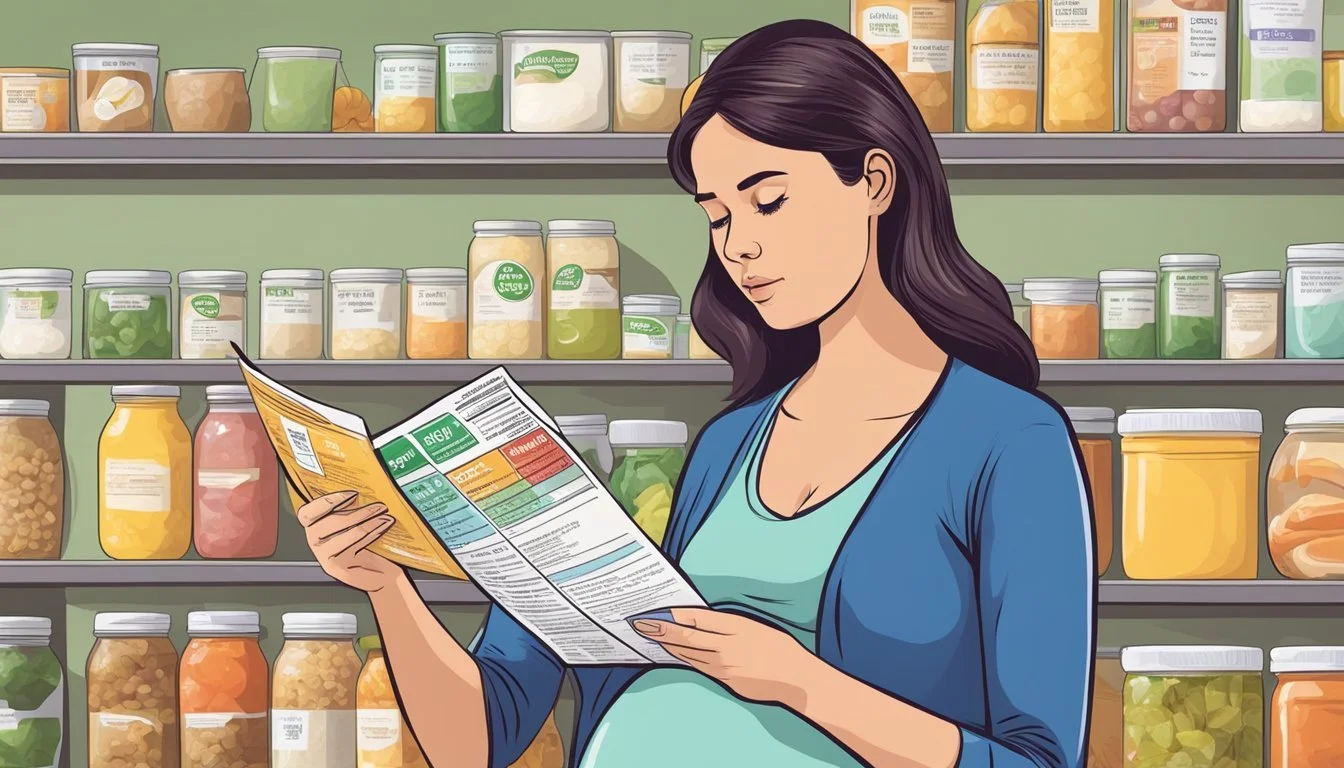Is it Safe to Consume MSG While Pregnant?
Unveiling the Facts on Food Additives and Pregnancy Health
Monosodium glutamate, commonly known as MSG, is a flavor enhancer that's been used in cooking for decades. It occurs naturally in some foods and is also added to others for its ability to enhance savory flavors. When it comes to pregnancy, dietary choices and the safety of certain food additives are subjects of significant importance and concern for expectant mothers. Questions frequently arise about whether ingredients such as MSG are safe to consume during this critical time.
Existing research suggests that consuming MSG in moderation during pregnancy is generally safe. MSG is digested by the body in the same manner as natural glutamate present in foods like cheese and tomatoes. While the majority of people can ingest MSG without adverse effects, it is noted that individual sensitivities, such as headaches or other reactions linked to MSG consumption, may lead some expectant mothers to avoid it.
Understanding MSG
Monosodium glutamate (MSG) is widely used in the culinary world to enhance the savory taste profile known as umami. This section will provide clarity on what MSG is, its role in flavor enhancement, and the common foods where it is found.
What Is MSG?
MSG, short for monosodium glutamate, is a food additive that is derived from glutamic acid, a type of amino acid that occurs naturally in various foods. It is a crystalline powder that combines sodium and glutamate, known for imparting the fifth taste or umami, which translates from Japanese as "essence of deliciousness."
The Role of MSG in Flavor Enhancement
As a flavor enhancer, MSG is added to foods to intensify and balance savory flavors without an overly dominant taste of its own. Glutamate is present naturally in many foods such as tomatoes and mushrooms, which contributes to their umami flavor, but MSG acts directly to stimulate taste receptors and amplify this savory quality.
Umami powder and seasonings containing MSG are especially popular for their ability to bring out the inherent flavors in dishes.
MSG works synergistically with other ingredients, such as vinegar or soy sauce, to elevate the overall taste experience.
Often found in seasoning blends, MSG enhances flavor by providing a fuller, more rounded taste.
Common Foods Containing MSG
MSG is commonly present in a variety of processed foods and can be identified in ingredients lists as monosodium glutamate, Ajinomoto, or umami seasoning. Some typical foods rich in added MSG are:
Fast food items and snacks such as chips.
Asian cuisine including soups and sauces like soy sauce.
A wide range of processed foods, including frozen dinners and snack foods.
Seasonings and seasoning blends, utilized for home cooking or by food manufacturers.
Health and MSG Consumption
Monosodium Glutamate (MSG) is widely used as a flavor enhancer in various foods, from condiments to salty snacks and canned soups. Its consumption during pregnancy has raised questions about safety and possible side effects.
FDA's Stance on MSG Safety
The Food and Drug Administration (FDA) has classified MSG as a Generally Recognized as Safe (GRAS) ingredient. However, they acknowledge that some people may experience short-term reactions to foods containing MSG. Pregnant individuals are advised to consult their healthcare provider for personalized advice.
Allergic Reactions and Sensitivities to MSG
Although rare, MSG may trigger allergic reactions or sensitivities in some individuals. Symptoms can include:
Headache
Flushed skin
Sweating
Facial pressure or tightness
Numbness, tingling, or burning in face, neck and other areas
Rapid, fluttering heartbeats (heart palpitations)
Chest pain
Weakness
It is crucial for those with MSG sensitivity to read food labels thoroughly and avoid foods containing MSG during pregnancy.
Side Effects Associated with MSG
Side effects from MSG are typically mild and don't require treatment. The most common include headaches and nausea. If someone experiences severe or concerning symptoms after consuming MSG, they should seek medical advice. However, adverse reactions such as headaches or dizziness are not consistently observed across the population, indicating individual differences in sensitivity.
MSG During Pregnancy
Monosodium glutamate (MSG) is a commonly used flavor enhancer that, during pregnancy, calls for careful consideration regarding its impact on fetal development and gestational health.
Impact of MSG on Fetal Development
MSG and Fetal Development: Research into the effects of MSG on developing fetuses is ongoing, with some studies suggesting potential risks. Key concerns include whether MSG crosses the placenta and its possible influence on the growth and development of the fetus. Distinct studies have highlighted contrasting outcomes; however, extreme consumption has been associated with an array of potentially negative effects.
Birth Defects and Miscarriage: While there's no conclusive evidence that MSG directly causes birth defects or miscarriage, some professionals advocate for moderation to minimize unknown risks.
Healthy Development: Ensuring the healthy development of the fetus is paramount. As such, dietary intake should focus on nutrients proven beneficial for fetal growth, which may or may not include MSG.
MSG Consumption and Gestational Health
Impact on Maternal Health:
Gestational Hypertension: Women are advised to maintain a balanced diet, as overconsumption of certain food additives may contribute to gestational conditions such as hypertension. The role of MSG in this context has not been clearly established.
Maternal Sensitivity: Some pregnant individuals may exhibit sensitivity to MSG, leading to symptoms like headaches or flushing, which can affect overall maternal comfort during pregnancy.
Guidelines for MSG Intake:
Moderation: Health agencies stress the importance of moderate consumption of MSG, mirroring the advice for other food additives.
Personal Health: Pregnant individuals with known adverse reactions to MSG are generally encouraged to avoid it to prevent discomfort and potential complications.
Nutritional Considerations for Pregnant Women
In the context of pregnancy, nutritional choices play a crucial role in both maternal well-being and fetal development. Special attention is given to maintaining a balanced diet and understanding components such as sodium intake, notably from MSG.
Balanced Diet During Pregnancy
A balanced diet during pregnancy ensures that pregnant women receive essential nutrients necessary for the healthy growth and development of the fetus. This diet should be rich in:
Fruits and vegetables: A variety of colors provides a wide range of vitamins and minerals.
Whole grains: Sources like brown rice and whole wheat bread offer necessary fiber and nutrients.
Lean proteins: Include choices like poultry, fish, beans, and nuts to support tissue growth.
Dairy products: They supply calcium necessary for the developing skeletal system of the baby.
Preparation of homemade meals is encouraged to control the quality and quantity of these ingredients. Women should read food labels carefully to ensure they are getting the right balance without excessive additives.
Sodium Intake and MSG
Sodium is a vital mineral important for fluid balance and nerve function but should be consumed in moderation during pregnancy. Pregnant women are advised to:
Limit intake of high-sodium packaged foods and broths which can contribute to excessive sodium levels.
Watch for MSG (monosodium glutamate), a common flavor enhancer in processed foods, which should be consumed in moderation subject to individual sensitivity.
Check food labels for MSG content, which must be listed when added to foods, to make informed decisions about their diet.
While the FDA considers MSG safe and classifies it as "generally recognized as safe," its inclusion in a pregnant woman's diet should be approached with caution, respecting individual health conditions and reactions.
Safe Consumption Guidelines
The safety of consuming MSG during pregnancy hinges on adherence to recommended intake guidelines and awareness of MSG in various food products. Ensure to consult healthcare professionals if there are concerns about allergies or other adverse reactions.
Recommended MSG Intake Limits
MSG is generally recognized as safe (GRAS) by the U.S. Food and Drug Administration when consumed in moderation. There are no specific limits set for MSG intake during pregnancy, but it's prudent to maintain a low sodium intake to manage potential pregnancy-related complications. Pregnant women should follow the general guideline of less than 2,300 milligrams of sodium per day from all sources, including MSG.
Alternatives to MSG in Cooking
For those looking to reduce MSG consumption, there are several natural flavor enhancers that can be used in cooking. Incorporating vegetables such as tomatoes and mushrooms adds a savory depth to dishes, often referred to as umami. Herbs and spices also serve as excellent alternatives to MSG in recipes, adding flavors without the need for added sodium.
Reading Food Labels for MSG Content
MSG can be present in various food items like processed meats, instant noodles, and freeze-dried meals. To manage intake, one should familiarize themselves with food labels:
Monosodium Glutamate: The most obvious indicator of MSG.
Hydrolyzed Vegetable Protein: A common ingredient that contains MSG.
Natural Flavors or Seasoning Mixes: These may contain MSG without explicit mention.
Individuals with MSG sensitivity or allergies should be particularly vigilant when reading labels. Pregnant women and those breastfeeding should ensure their instant noodles or soup mixes consumption does not lead to a high amount of MSG intake, aligning with the moderation principle.





